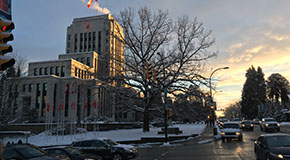Adam Nanji
/ Vancouver Is Awesome
Chipping Stations
The City of Vancouver, along with the Lions Club, is organizing four tree recycling stations across the city. They also encourage you to bring a non-perishable food item; they will be distributing donations to local charities.
Tree chipping stations are open 10 a.m. to 4 p.m. on January 6 and 7, 2018
Curbside Pick Up
The city collects trees via curbside pickup. If you have Green Bin service, put your tree out by 7 a.m. on Jan 14.
Transfer Station or Landfill
Bring your tree to a Vancouver Transfer Station or landfill and recycle it for free until Jan 31, 2018.
Vancouver South Transfer Station: 377 West Kent Ave. North, Vancouver
Vancouver Landfill and Recycling Depot: 5400 72nd St, Delta
December 29, 2017
The City of Vancouver, along with the Lions Club, is organizing four tree recycling stations across the city. They also encourage you to bring a non-perishable food item; they will be distributing donations to local charities.
Tree chipping stations are open 10 a.m. to 4 p.m. on January 6 and 7, 2018
- Sunset Beach Upper Parking Lot, Beach Ave. and Broughton St.
- Trout Lake Community Centre Parking Lot 3360 Victoria Drive
- Kitsilano Beach Parking Lot, Cornwall Ave. and Arbutus St.
- Kerrisdale Ice Rink Parking Lot, 5670 East Blvd.
Curbside Pick Up
The city collects trees via curbside pickup. If you have Green Bin service, put your tree out by 7 a.m. on Jan 14.
Transfer Station or Landfill
Bring your tree to a Vancouver Transfer Station or landfill and recycle it for free until Jan 31, 2018.
Vancouver South Transfer Station: 377 West Kent Ave. North, Vancouver
Vancouver Landfill and Recycling Depot: 5400 72nd St, Delta



